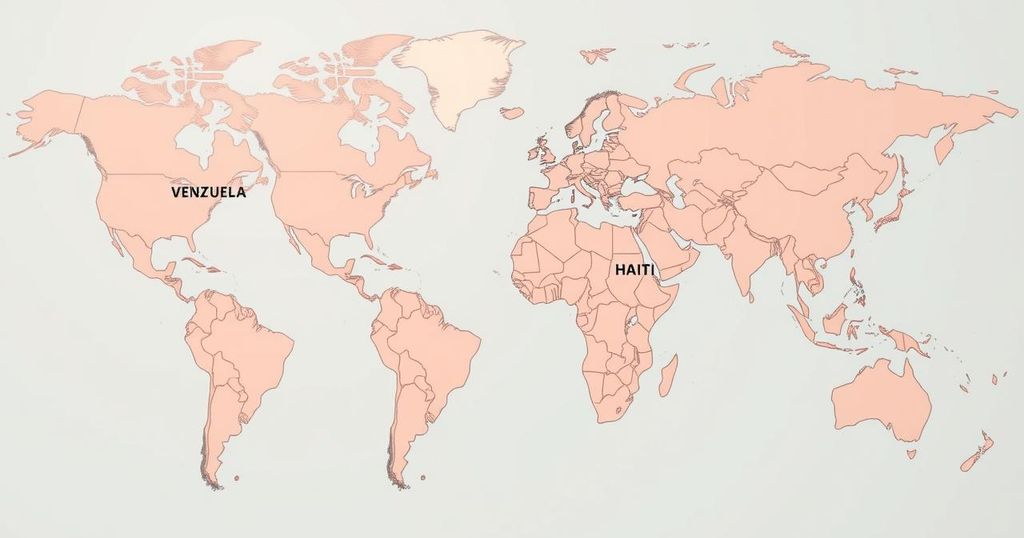Trump Imposes Travel Ban on Haiti, Cuba, and Venezuela Amid Immigration Policies

President Donald Trump announced a travel ban affecting Haitian nationals and partial restrictions on Cubans and Venezuelans, effective June 9. The decision is part of a broader immigration crackdown. Critics argue it targets vulnerable populations and could worsen familial separations.
In a significant move, President Donald Trump announced on Wednesday a complete travel ban on Haitian nationals entering the United States, while also imposing partial restrictions on Cubans and Venezuelans. This latest travel ban is part of a wider crackdown on legal immigration policies. The proclamation issued by the White House is set to go into effect on June 9 and underscores the administration’s ongoing efforts to limit immigration from these specific countries.
According to the proclamation, Haitian nationals face a full suspension on entering the U.S. Additionally, the entry of Cuban and Venezuelan nationals will be significantly restricted, affecting various visa categories, including those for tourists, business, and academic purposes. The ban, however, will not impact individuals holding valid visas at the time.
The travel ban reflects a broader federal strategy to tighten immigration controls since Trump’s presidency began. Early on, he directed his administration to assess the adequacy of vetting and screening processes for certain countries, aiming to suspend visas for nations deemed insufficiently secure.
This policy shift comes as a shock to many, particularly during events such as the annual Haiti Funders Conference held in Boston. Attendees expressed concerns about the implications of this ban. Brian Concannon, from the Institute for Justice and Democracy, criticized the approach as discriminatory, stating that it does not enhance U.S. national security and constitutes a targeted attack against Haitians.
The proclamation cites reasons related to national security as underpinning the travel restrictions. Trump emphasized that these countries lack sufficient vetting for travelers, which could pose risks to American safety. Furthermore, Cuba is classified as a state sponsor of terrorism under U.S. law. Consequently, restrictions on visas from countries identified as security concerns may become more commonplace.
Besides Haiti, the travel ban will affect other nations as well. The complete ban encompasses countries like Afghanistan, Iraq, and Libya, while places such as Burundi and Laos face partial bans. The implications of these measures particularly impact individuals from these nations who are currently outside the U.S. without valid visas.
While there are specific exceptions noted in the proclamation — such as for green card holders and certain family members of U.S. citizens — many potential visitors face barriers to entry. Diplomatic personnel, members of foreign governments, and international organization representatives may still be exempt from these restrictions.
Human rights advocates were swift to respond to the announcement. Organizations like Human Rights First voiced their disapproval, highlighting that this continuation of strict immigration policies disproportionately affects vulnerable populations, including refugees and asylum seekers. This new ban is seen not only as an immigrant issue but also one that contradicts the U.S.’s national security interests.
The repercussions of this ban extend beyond immediate entry restrictions; it disrupts familial connections, particularly for Haitian nationals who play vital roles in the support systems of families spread across borders. Pierre Imbert, a community leader, lamented how critical U.S. access is for sustaining these connections.
This proclamation follows earlier travel bans instituted during Trump’s first term, which originally targeted travelers from select Muslim-majority countries for national security reasons. The evolving nature of these travel restrictions illustrates a consistent pattern in Trump’s approach to immigration and his administration’s priorities regarding national security and border control.
President Trump’s recent proclamation imposes stringent travel restrictions, particularly on Haitians and includes partial bans on Cuban and Venezuelan nationals, as a part of ongoing immigration control efforts. These measures, which take effect on June 9, alarm human rights advocates and many individuals directly affected. This policy not only raises significant implications for families experiencing separation but also reflects the administration’s long-standing focus on national security concerns surrounding immigration.
Original Source: www.yahoo.com







